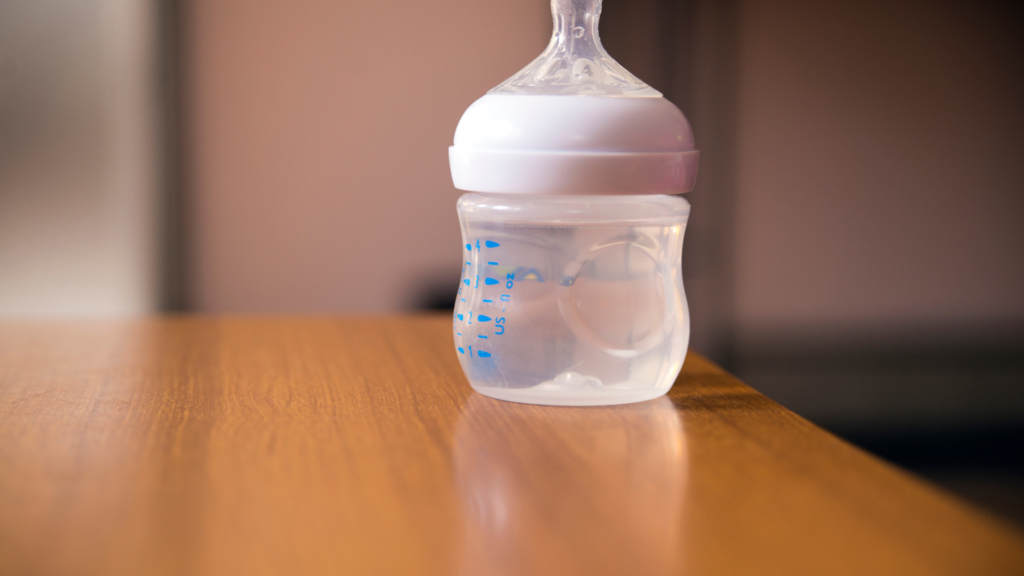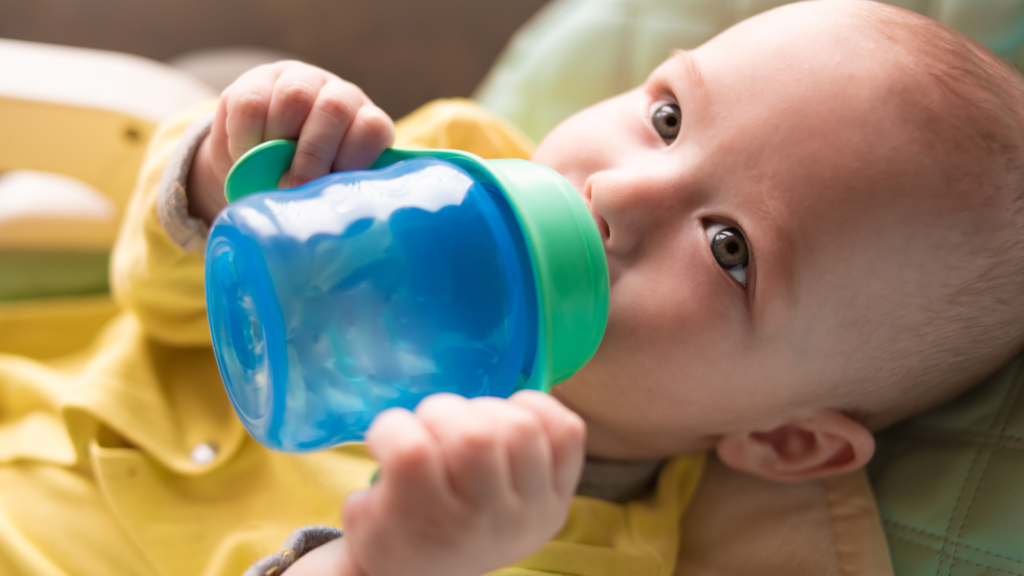In the delicate and transformative first year of life, ensuring proper hydration for an infant is paramount to fostering optimal growth, health, and development. Yet, the needs of these tiny beings are distinct from those of older children and adults, often leading to a plethora of questions and concerns among caregivers. How much is too much, and when is it not enough?
As the foundation of life, water plays a pivotal role in nearly every bodily function, making its significance in infant health undeniable. This article seeks to illuminate the intricacies of infant hydration, providing insights and guidelines to navigate this critical aspect of infant care. Whether you’re a new parent, a seasoned caregiver, or simply keen to understand the world of infant hydration, we invite you on this enlightening journey.

Understanding Infant Hydration: The Basics
When it comes to caring for our youngest, the hydration requirements of infants are a pivotal area of concern. It’s a treasure island of information waiting to be uncovered.
The role of water in infant metabolism and growth cannot be overstated. Water acts as the carrier for important nutrients, facilitating their transport and utilization in the body. For infants, breast milk or formula provides virtually all the hydration and nutrients they need. In fact, for the first six months of age, babies receive all the nutrition and hydration they require from breastmilk or formula, without the need for supplemental water. This stands in contrast to sugary drinks, cow’s milk, and caffeinated drinks, which the American Academy of Pediatrics recommends avoiding for young children ages less than 1 year.
When should babies drink water, then? Introducing water usually aligns with the introduction of solid foods in a baby’s diet, typically around the six-month mark. Even then, the quantity remains minimal, increasing gradually as the child grows. While a sippy cup or straw cup can be introduced to familiarize babies with drinking water, the primary recommended drinks remain breast milk and infant formula. As a child’s age progresses and a diet rich in fruits and vegetables takes shape, plain water becomes an essential counterpart to ensure healthy hydration.
Signs of proper hydration in infants are crucial for caregivers to understand. Wet diapers, for instance, are a prime indication. An adequately hydrated baby typically has 5-8 wet diapers in a 24-hour period. Other signs include:
- Supple and moist skin.
- Pink and moist lips and mouth.
- Eyes that appear normal, not sunken.
Contrastingly, signs of dehydration can be more alarming. These include a dry mouth, few tears when crying, sunken eyes, and decreased urine output. In severe cases, severe dehydration can manifest, which requires immediate attention from a healthcare provider.
However, just as too little can be concerning, so can too much. Water intoxication, a result of offering babies too much water, especially before six months of age, can be dangerous. It can lead to imbalances in essential nutrients, notably sodium, resulting in serious complications.
So, how much water should kids drink? As a rule of thumb, babies less than six months old shouldn’t be given water unless advised by the child’s doctor. From 6-12 months, small sips from a sippy cup are generally safe, especially in hot weather. As they transition to toddlerhood, their water intake increases. Consultation with a registered dietitian or pediatrician provides the best guidance tailored to individual needs.
It’s also worth noting the types of water to avoid. Tap water, depending on its source, might not be suitable for babies. Before introducing water, ensure it’s from a safe and approved source.

Breastfeeding vs. Formula-feeding: Hydration Considerations
In the world of infant care, the discussion of breastfeeding versus formula-feeding often leads to passionate discussions. Both pathways have their merits, and ultimately, the choice lies with caregivers and what suits their lifestyles and the baby’s needs. Beyond nutrition, a critical aspect to consider is how each method impacts hydration. Given the vital role of hydration in early development, understanding the nuances can guide parents in ensuring their young ones receive adequate hydration.
Benefits of Breast Milk for Hydration
Breast milk is nature’s specially designed concoction for infants. Not only is it packed with essential nutrients, but it also provides comprehensive hydration. Unlike cow’s milk or sugary drinks, breast milk adjusts its composition based on the baby’s needs. On hot days, for instance, it may become more watery to ensure babies stay hydrated. Additionally, the American Academy of Pediatrics attests to the adequacy of breast milk for both nutrition and hydration for the first six months of life. There’s usually no need to introduce water or other drinks at a young age when exclusively breastfeeding.
How Formula Can Meet an Infant’s Hydration Needs
Baby formula, designed to mimic the nutrient composition of breast milk, is another valid route to ensure infants get both essential nutrition and hydration. Unlike whole milk, which is harder for infants to digest and lacks certain vital nutrients, baby formula is fortified to meet an infant’s needs. As long as the formula is prepared according to recommendations, it offers adequate hydration, negating the need for additional water in the first few months. Caregivers should be cautious to avoid excess weight gain or overfeeding and follow pediatrician recommendations on quantities.
Considerations for Supplementing with Water
Whether a child is breastfed or formula-fed, the general rule is that additional water isn’t required for the first six months. However, there are exceptions. In especially hot climates or if the baby has signs of moderate dehydration (like a sore throat or fewer wet diapers), introducing small amounts of water can be beneficial. However, caution is imperative. Water intoxication, a condition where babies drink too much water, diluting their internal sodium levels, can be severe. It’s essential to offer water in small sips and not replace recommended drinks, be it breastmilk or formula, with water. Always use safe sources like boiled and cooled tap water, especially in areas where water quality might be questionable.

Safe Water Practices for Infants
The introduction of water to an infant’s diet is a significant milestone that warrants careful consideration. While breast milk or formula remains the primary source of nutrition and hydration for the initial months, there comes a time when water becomes an essential part of an infant’s daily intake. This addition, however, requires certain precautions to ensure safety and health for our little ones.
When to Introduce Water to an Infant’s Diet:
Guided by the American Academy of Pediatrics, the general recommendation is to introduce water around the six-month mark, aligning with the typical introduction of solid foods. Before this age, babies receive all the hydration they need from breast milk or formula. Introducing water too early can not only fill their small stomachs, potentially making them less hungry for actual nutrients from milk, but also risk water intoxication, a rare but serious condition.
Ensuring Safe and Contaminant-Free Water:
While tap water in many places is treated and safe for adults, it might contain elements not suitable for an infant’s delicate system. Here are some steps to ensure water safety:
1. Boil and Cool: Always boil the tap water for infants to kill any harmful bacteria or parasites, then let it cool down to a safe temperature before offering it to the baby. This practice is recommended until the baby’s first birthday.
2. Avoiding Certain Drinks: Steer clear of sports drinks or other drinks designed for adults. They can contain elements, like excessive sugars or salts, which aren’t suitable for infants and can lead to tooth decay or other health issues.
3. Filtered Water: If you’re using filtered water, ensure the filter system is certified to remove bacteria and, if required, change filters regularly.
Recommended Water Intake by Age:
1. 0-6 months: Exclusively breastmilk or formula. No additional water is required.
2. 6-12 months: As solid foods are introduced, you can offer sips of water to complement their diet. Around 2-4 ounces of water over 24 hours is usually enough to keep them well-hydrated, especially on a hot day or when they’re more active.
3. 12 months and beyond: As babies grow and their diet becomes more diverse, their water intake will naturally increase. By the time they’re a year old, they can be drinking more water, around 8 ounces (1 cup) spread across 2-3 sippings a day. Always monitor for signs of dehydration and adjust as necessary.
Conclusion
The journey of infancy is a delicate dance of growth, discovery, and nurturing. As caregivers, ensuring our little ones receive the optimal hydration is a fundamental part of fostering their well-being and development. While the world of infant hydration, from breastmilk to formula, and the eventual introduction of water, may seem intricate, it is deeply rooted in the natural processes designed for their health.
Through a blend of informed choices, attentive observation, and trust in the guidelines set forth by experts like the American Academy of Pediatrics, parents and caregivers can confidently navigate this crucial aspect of infant care. Always remember, every drop counts in building the foundation for a lifetime of health and vitality. As we close this exploration on “Hydration Essentials,” may every sip, every ounce, and every feeding moment be a testament to the profound love and care we bestow upon our youngest treasures.
Did the article help you? Please leave a comment below. If you have any questions, please let me know.



